Bill Marinelli, President and CEO, presented the 2022 Technical Achievement Awards to formally recognize the most significant technical achievements by our staff this past year. With hundreds of ongoing projects and numerous noteworthy contributors, the selection process is always difficult, and these awards recognize only a small fraction of the many significant accomplishments by our talented staff.
Development of A Deep Ultraviolet Proximal Raman Sensor
Rusha Chatterjee, Principal Research Scientist; Katharine Lunny, Principal Scientist; Michael Hilton, Senior Research Engineer; Michael Chase, Principal Project Engineer; and Jay Giblin, Group Leader, Exploitation Technologies, were presented with Achievement Awards for the development of a highly integrated deep UV proximal Raman sensor. The sensor combines recent advances in deep UV laser sources with PSI’s Spatial Heterodyne Spectrometer technology and is successfully operated at the extreme limits of its expected stability. This system demonstrates the ability to detect trace explosive residues at ranges to 1 meter, and was delivered to the Government customer. The successful completion of the project resulted in additional efforts with other Government agencies.
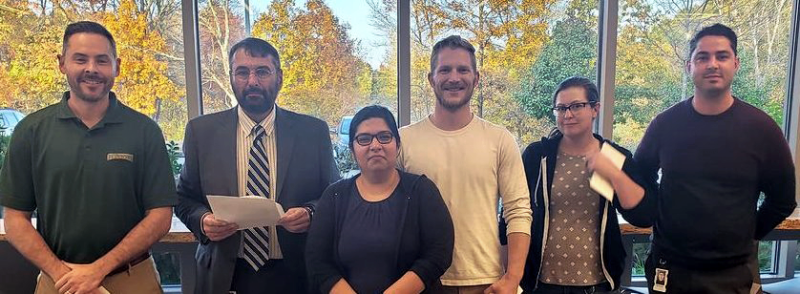
Jay Giblin, Bill Marinelli, Rusha Chatterjee, Michael Chase, Katharine Lunny, and Michael Hilton
Re-Curve Antenna
Alex Mednick, Principal Engineer; Brian Schweinhart, Senior Engineer; and Sean Torrez, Area Manager, Deployable Structures, were presented with Achievement Awards for providing the Government customer with a space antenna for a radio demonstration project on-board a CubeSat. Their efforts included the design of the novel antenna array; build of the antenna, structure, and feed; and environmental/performance testing of the antenna. The antenna flew in July 2022, remains operational, and will provide the customer with decision making information. This activity re-establishes PSI’s operational space capability.
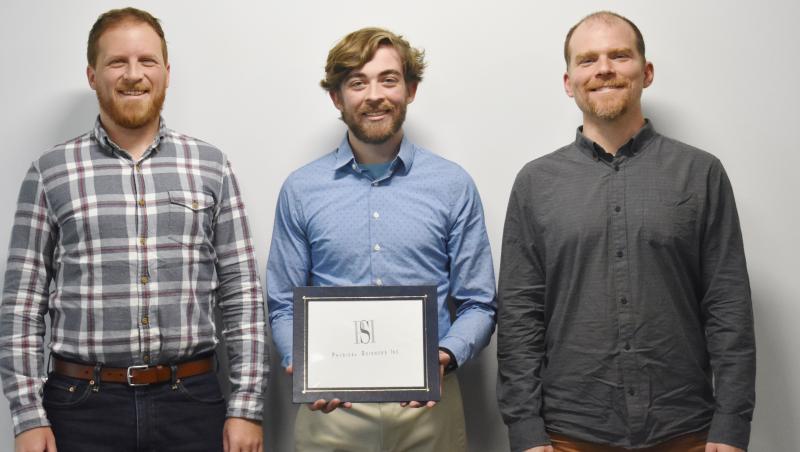
Alex Mednick, Brian Schweinhart, and Sean Torrez
Atmospheric Water Extraction Project
Caitlin Bien, Principal Scientist; Jacob Miske, Senior Engineer; Zachary Whitermore, Senior Research Scientist; John Grimble, Project Engineer; Tiffany Yu, Senior Research Scientist; Travis Emery, Principal Engineer; and David Gamliel, Principal Research Scientist, received Technical Achievement Awards for their successful development of Smart Water Absorbing Foam technology to provide potable water for a range of military, stabilization, and humanitarian needs through the extraction of water from the atmosphere. This PSI-led team surpassed competing teams from two major universities, a DoD lab, and a large company in delivering a functional prototype in the feasibility phase of the program. In doing so, it became a leading candidate to receive the next funding increment while concurrently building a capability at PSI supporting advanced sorbent and other materials development efforts. We also gratefully recognize the contributions of Bryan Sharkey, Albert Wright, Jeffrey Yee, and Nicholas Skovran.
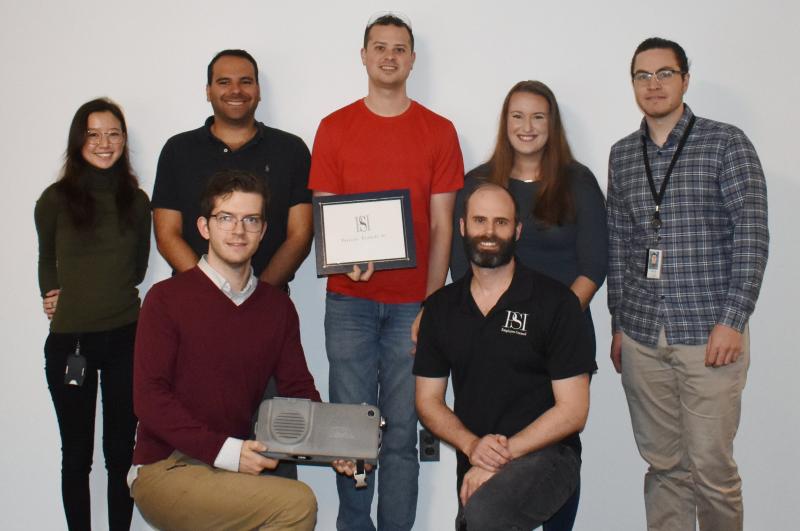
(back) Tiffany Yu, David Gamliel, Zachary Whitermore, Caitlin Bien, and Travis Emery (front) Jacob Miske and John Grimble
Development of Solid Rocket Motor Technology
Michael Behrens, Principal Research Engineer; Shigeng Shang, Senior Research Engineer; Chris Farrell, Senior Research Engineer; and Athanasios Moshos, Senior Research Engineer, were presented with Achievement Awards for achieving significant advances in the production of solid rocket motor propellants and their use in demonstrating PSI’s insensitive munition case technology. Specifically, the ability to safely and remotely produce solid rocket motor propellants in 11 lb. quantities, to flawlessly cast those propellants into PSI’s Insensitive Munitions case technology, and in doing so, successfully demonstrate the technology under operational scenarios. With this achievement, the team has reinforced PSI’s reputation as an innovative developer of energetics technologies and further established the Epping, NH test site as a unique and cost effective facility for developing and evaluating energetic systems.
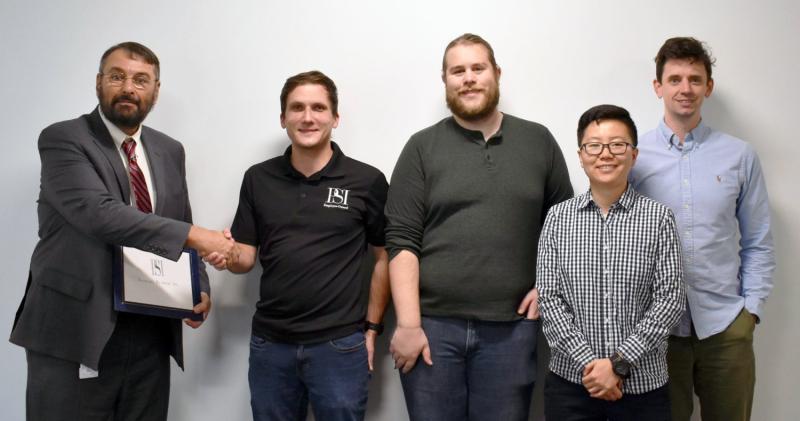
l-r: Bill Marinelli presents Achievement Award to Athanasios Moshos, Chris Farrell, Shigeng Shang, and Michael Behrens
Hyperspectral Imager for COBRA Minefield Detection
Stephanie Craig, Principal Project Scientist; Michael Chase, Principal Project Engineer; Dave Mansur, Principal Project Engineer; and John Dixon, Principal Scientist were awarded with Achievement Awards for producing and successfully flight testing an airborne minefield detection capability based on PSI’s high speed VNIR/SWIR hyperspectral imager. The team supported a successful first flight test on a helicopter, where the sensor was able to resolve relevant objects at an operational altitude and speed of advance. We also acknowledge the important role that Katharine Lunny, Dan Hewett, Gabriel Weedon, Michael Primrose, and Chris Gittins played throughout the program.
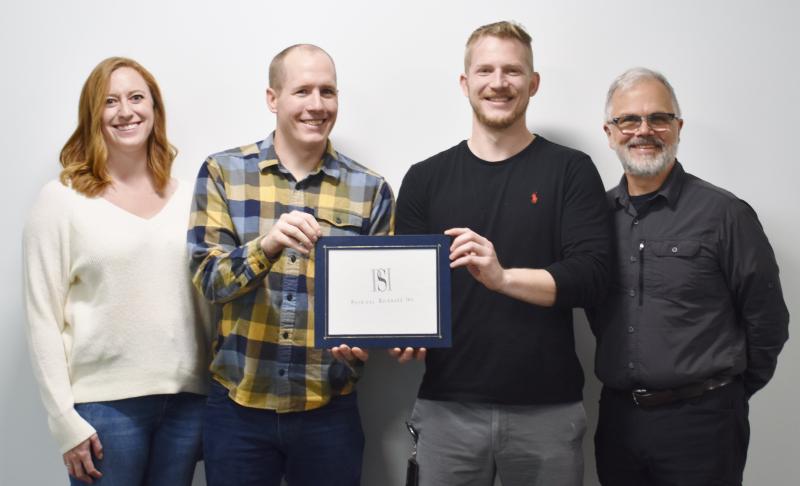
Stephanie Craig, John Dixon, Michael Chase, and Dave Mansur
Contract News
PSI recently received the following research contracts:
“Low-Alpha, Variable Emissivity Radiator (LAVER) Panels for Passive Thermal Regulation of Spacecraft” from National Aeronautics and Space Administration (NASA)
“Smart Sensor for Guiding Safe Delivery of Anesthetic and Pain Drugs Through Epidurals” from the National Institutes of Health (NIH)
“Enhanced Electrodynamic Tethers for High Altitude Deorbit Operations” from the U.S. Air Force and the United States Space Force (USSF)
“Recycling Fast-Response Atom Interferometer for Navigation (ReFRAIN) from the Office of the Secretary of Defense
“UV-Curable Energetic Polymers for Vat Polymerization of Gun Propellants”, “Low-cost Integrated Blast Acquisition Test Surrogate”, and “High Energy Density Resin Systems for Additive Manufacturing of Explosive and Propellant Formulations” from the U.S. Army
For more PSI news, visit www.psicorp.com/news.













